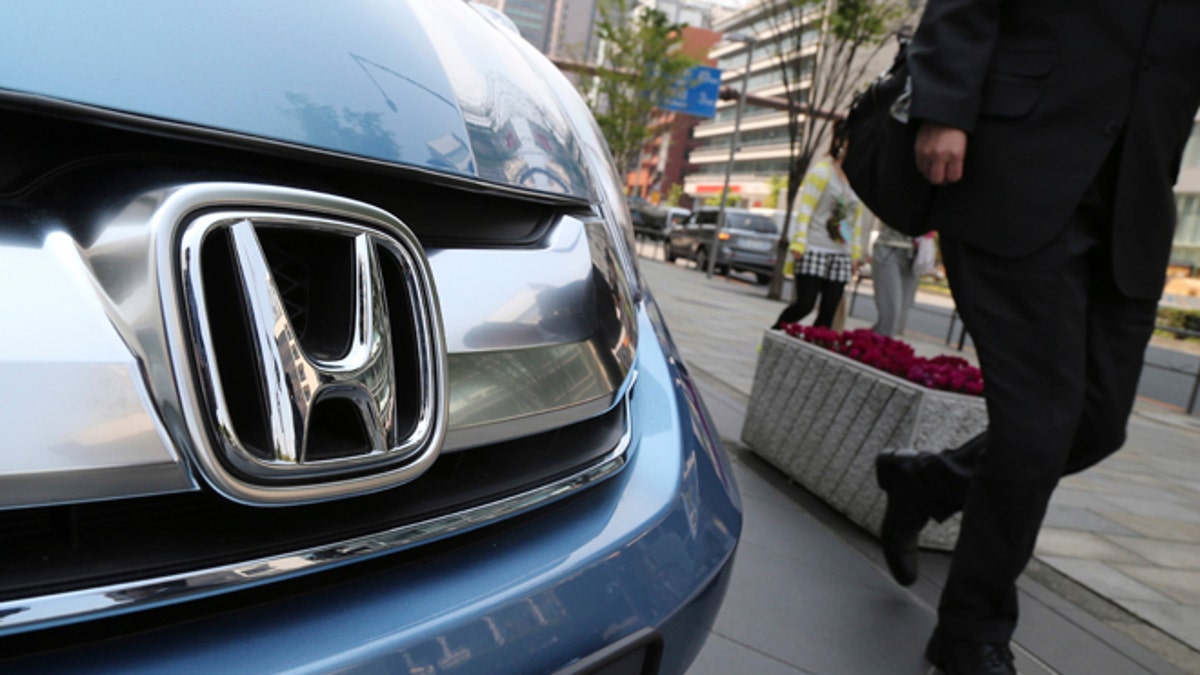
In this April 25, 2014 file photo, a man walks past a Honda on display at Honda Motor Co. headquarters in Tokyo. (AP)
The Obama administration said Thursday it is fining Honda $70 million -- the largest civil penalty levied against an automaker -- for not reporting to regulators some 1,729 complaints that its vehicles caused deaths and injuries, and for not reporting warranty claims.
The Japanese automaker acknowledged in November that it failed to report the death and injury complaints to the National Highway Traffic Safety Administration over an 11-year period beginning in 2003. The company admitted it learned of the omissions in 2011 but had waited three years to take action.
Honda also failed to report certain warranty claims and claims under customer satisfaction campaigns throughout the same period, federal officials said. The safety administration is imposing twin fines: $35 million for not reporting the death and injury complaints, and another $35 million for not reporting the warranty and customer satisfaction claims. Both fines are the maximums the agency is legally allowed to impose.
Transportation Secretary Anthony Foxx said the fines reflect the government's determination to take a tough stance against automakers who withhold safety information from regulators.
"What we cannot tolerate and will not tolerate is an automaker failing to report to us any recall issues," Foxx said.
The Honda complaints include incidents related to air bags made by Japanese auto supplier Takata Corp., as well as other defective parts. Honda has recalled more than 5 million vehicles in the U.S. since 2008 to fix a potentially fatal defect in Takata-made air bags. The air bag inflators can rupture after a crash and injure occupants with shards of metal.
Honda has agreed to pay the fines under a consent order it signed with the traffic safety administration on Dec. 29, federal officials said. But officials said they have not yet received all the complaints from Honda and therefore don't have a tally of how many deaths and injuries are involved.
"We have resolved this matter and will move forward to build on the important actions Honda has already taken to address our past shortcomings in early warning reporting," Rick Schostek, executive vice president of Honda North America Inc., said in a statement.
The company blamed the omissions on "errors related to data entry, computer coding, regulatory interpretation, and other errors in warranty and property damage claims reporting."
Foxx said information about Honda's failure to disclose the complaints also has been forwarded to the Justice Department. The Center for Auto Safety, a consumer watchdog group, called for a criminal investigation of Honda after the company's failure to disclose the complaints became public.
Clarence Ditlow, executive director of the center, said $70 million is too small a penalty considering that incidents involving Takata air bags are among the complaints not reported.
"How many other deadly defects are concealed in the 1,729 death and injury claims not reported by Honda?" he asked. "The company must waive all statutes of limitations at the state and federal level over potential recalls or lawsuits arising out of defects concealed in the unreported claims."
Federal law requires automakers to submit death and injury complaints to regulators as part of an "early warning" system for identifying potential safety defects that can lead to a recall.
The fine against Honda caps a tumultuous year for automakers and federal regulators. Including the fine against Honda, the traffic safety administration imposed $126 million in fines against automakers in 2014, more than all the fines in the agency's previous 43 years.
In May, the traffic safety administration levied the first maximum $35 million fine in its history against General Motors for taking more than a decade to disclose an ignition-switch defect in millions of cars that has been linked to at least 42 deaths and 58 injuries.
Under an agreement with the Transportation Department, GM admitted it was slow to inform regulators, promised to report problems faster and submitted to more in-depth government oversight of its safety operations.
But lawmakers and safety advocates have also accused the traffic safety administration of having too cozy a relationship with the auto industry and for not identifying dangerous safety defects based on reports made directly to the agency by consumers and police.




